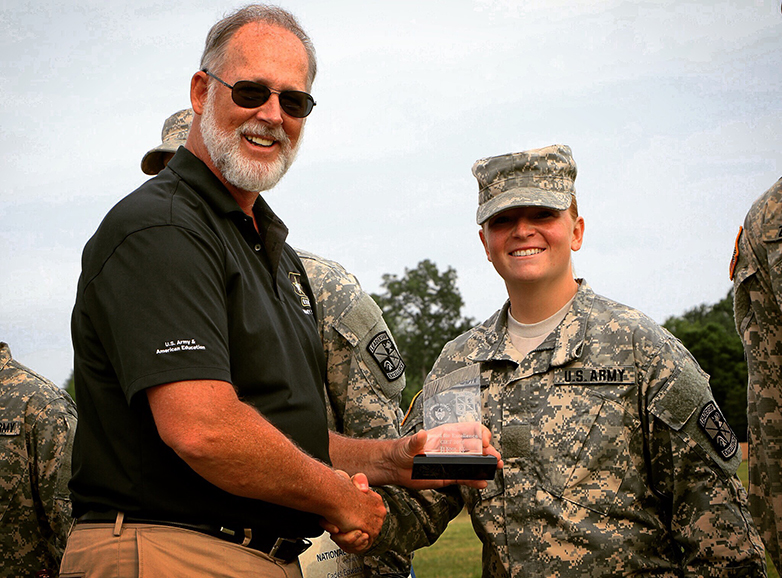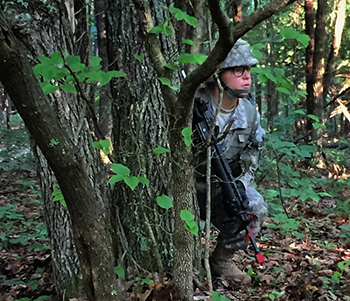SRU Army ROTC cadets answer summer roll call

Danielle Wilson, a Slippery Rock University Army ROTC cadet, received the Armed Forces Services Corporation Award during the Cadet Initial Entry Training program graduation ceremony at Fort Knox, Kentucky.
July 14, 2016
SLIPPERY ROCK, Pa. - Most college students lifeguard at the pool, work retail or suffer "the summertime blues" in June, July and August. Not so for 34 Slippery Rock University Army ROTC cadets that are dedicating their summers to tactical and cultural training through the ROTC Cadet Summer Training Program.
Cadets' duty stations include Cadet Initial Entry Training, Cadet Leaders Course and the Cultural Understanding and Language Proficiency Program. Additionally, Jacob Fiscus, a criminology major from Sharon, and Daniel Seasock, a public health major from Wilkes Barre, will attend Air Assault School at Fort Campbell, Kentucky, to learn how to repel from assault helicopters.
Students are studying warfare, marksmanship, land navigation, first aid and immersing themselves in the cultures of Lithuania, Thailand, Montenegro, the Dominican Republic of Congo and Liberia.
And yes, they're doing their share of pushups, two-mile runs and combat readiness drills.
"Cadet Summer Training is possibly one of the largest summer internship programs and an absolutely incredible opportunity for our students from Slippery Rock and Clarion universities," said Lt. Col. Jeff Barta, professor of military science and commander of the Army ROTC program at SRU/Clarion.
"This summer, nearly half of the cadets from our program will enhance their leadership growth while participating in a unique transformational experience," Barta said. "Cadets are brought together with others from more than 275 universities to practice their leadership skills, learn from each other and other Army leaders."
Barta said the program is a large investment in the Army and the country.
"In the Army leader development construct, this is a chance to integrate skills learned through self study and the institutional domain on campus into operational practice while being challenged in new ways that will help our cadets develop," he said. "As they have traveled across the globe this summer, I have received extremely positive feedback about the success of our Slippery Rock and Clarion students."
One such success story is Danielle Wilson, an SRU Army ROTC member who was presented the Armed Forces Services Corporation Award by Major Gen. Christopher Hughes for "best demonstrating an understanding of the moral requirement for a strong work ethic and positive attitude to achieve individual and group objectives," at Cadet Initial Entry Training. She was one of only 16 cadets in the class of 400 to be recognized.
Cadet Initial Entry Training, for raw recruits, is a four-week introduction to Army life and leadership. It targets college students between their sophomore and juniors years, aiming to motivate cadets to make a long-term commitment to the Army.
"I expected to learn a lot and I did," said Wilson, a history major from Forrest Hill, Maryland. "The best part was learning from the non-commissioned officers. Everything they taught me laid the foundation for my desire to be an active-duty officer."

Wilson participating in training exercises at Fort Knox.
Wilson spent her first few days learning Army basics under the tutelage of drill sergeants. She took the Army Physical Fitness Test, which consists of sit-ups, push-ups, and runs. She was introduced to working in team-based dynamics through obstacle course work.
Before her basic training, Wilson said she had "very little experience" with the Army. "I had about three weeks of ROTC and that's it."
She said the experience was tough but rewarding. She participated in high ropes, how to respond to being exposed to tear gas and how to dress, march, carry an M-16 and "even stand in line they way our drill sergeants wanted us to."
"Intertwined through everything we did as cadets in training was discipline, which I believe was one of the most rewarding parts of camp," she said. "Each platoon of about 50 cadets was assigned two drill sergeants, that surely ensured we were on our best 'high-speed' behavior."
Wilson said she spent three days in a "tent city," with no showers and slept outside. They stepped into a simulated war where their mission was to restore peace to the area they were patrolling.
"Each day in the field, we were given specific orders that helped us understand what actions needed to be taken as we preformed reconnaissance, ambush and reacted to contact missions," Wilson said. "Each night, we were 'attacked,' either by mortars or direct contact by SAPPA, which really gave the field a tactical feel."
Wilson said the camp was great and valuable to her growth.
"I learned more than I expected and most importantly learned the importance of leading men and women in the Army. In time, each of us will be responsible for many soldiers. The skills we learn in training, and the experiences we have, will directly correlate to our success in the future," she said.
Seniors cadets participate in the Cadet Leaders Course at Fort Knox, Kentucky. The one-month program trains cadets to officer standards. The program includes infantry, weaponry and classroom instruction. LeAnn Penn, a biology major from Cortland, Ohio who serves as the first female captain of the Ranger Challenge Team at SRU, is attending the Cadet Leaders Course.
Cadets conduct rifle marksmanship with the M4 rifle, the standard issue firearm for most units. They also learn how to fire a light machine gun and become familiar with grenade launchers.
Another aspect of the advanced training involves familiarizing cadets with the Army's chemical and biological protective gear, including facemasks. Cadets study leadership challenges associated with chemical, biological and nuclear scenarios.
Six SRU cadets are participating in the Cultural Understand and Language Proficiency Program.
The CULP program sends cadets around the globe for three weeks of cultural and language training in a foreign country.
Jared Flood, an information technology major from Slippery Rock, and Kevin Reno, a psychology major from Mercer travelled to Lithuania; Jonathan Baker, a history major from Pittsburgh, to the Congo; Donald Sanders, a criminology major from Hopewell, went to Thailand; Mike Austin, a business management major from Pittsburgh, studied in Montenegro' and Tyson Miller, a safety management major from Bellwood, visited Liberia. Baker will also attend the Basic Airborne Course at Fort Benning, Georgia.
Sanders said his mission to Thailand required medical and legal clearances from the brass at Fort Knox. After obtaining the go-ahead, he flew to Bangkok, spent one night there and drove to the Chulachomklao Royal Military Academy to work with Thai cadets.
"Differences between Thai and American culture were already evident. Some of the things that stuck out were shantytowns sitting in the shadow of modern skyscrapers and a mother and three children all riding on one motor scooter," he said.
At the academy, Sanders said he taught basic, conversational English and American geography. Thai cadets clued him in on the "Thai way of life and thinking."
"At times, that way of thinking was incompatible with our own," he said. " Very quickly, we realized - mostly from relying on them for transportation - that we were on 'Thai time.' That means they'll get there when they get there, they'll get it done when they get it done. Understanding cultural difference is important for working with them in the future. Still, the Thai cadets shared a lot of similarities and interests with me, and they were a fun bunch to hang out with."
For several days, Sanders said he worked for an orphanage outside the city of Pattaya. He dug holes and slit trenches in the heat and humidity without proper tools, but no one complained.
"The children there were a bundle of fun, and we didn't need to understand what they were saying to be able to interact with them after the day's work. It's like they breathed energy into us," he said.
"It was one of the best experiences of my life, and the Army paid for me to do it," he said. "Every cadet should at least apply for CULP as it helps to broaden horizons and prepares one for a future of working with foreign cultures."
Miller traveled to Liberia with the CULP training program.
"I and cadets from other schools were able to see the major tourist attractions in Liberia and also help the soldiers of the Armed Forces of Liberia better their English," Miller said. "It was a really neat experience because I was able to see first hand what it is like in a third world country. It was a little hard communicating with the locals at times even though they speak English. It was a once in a lifetime opportunity and I am very grateful I was selected to go."
Miller said he would complete Cadet Initial Entry Training at the end of July.
"Summer training is extremely valuable and teaches cadets a lot," he said. "My time at SRU has been short but the highlight has definitely been the ROTC program. It's like one big family that supports each other and the cadre are extremely knowledgeable and do whatever they can to help cadets succeed."
MEDIA CONTACT: Gordon Ovenshine | 724.738.4854 | gordon.ovenshine@sru.edu

